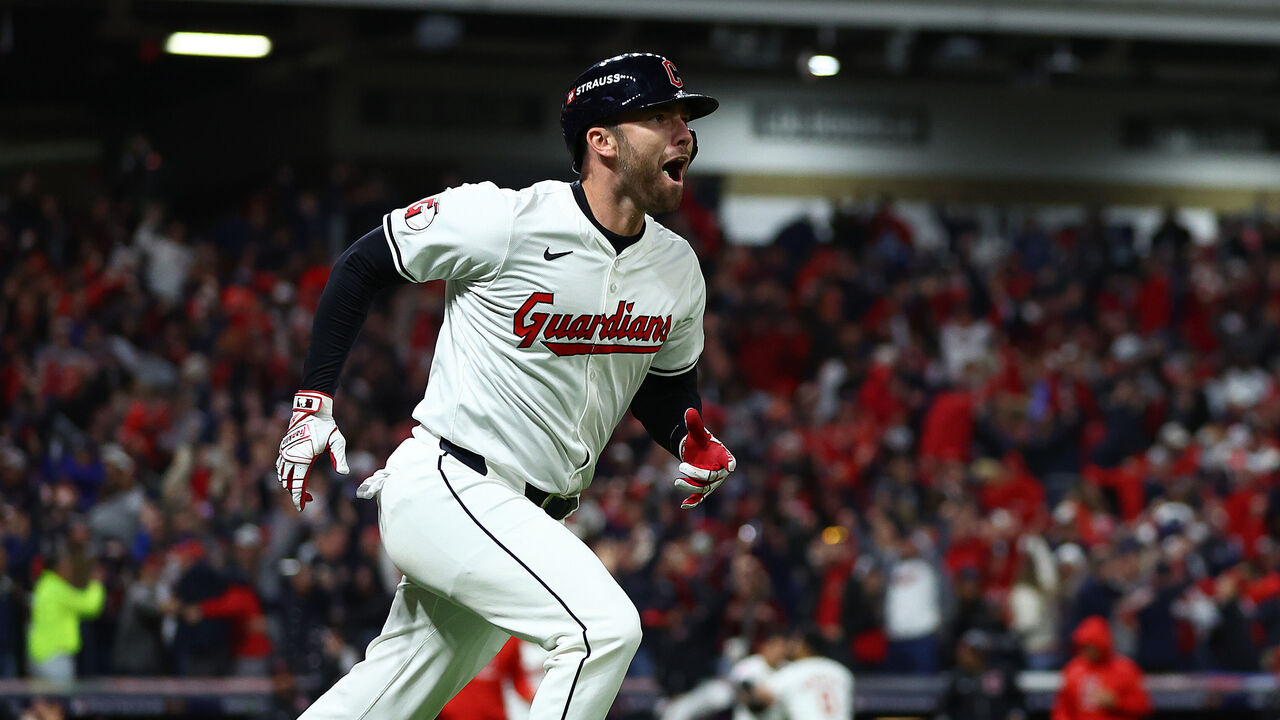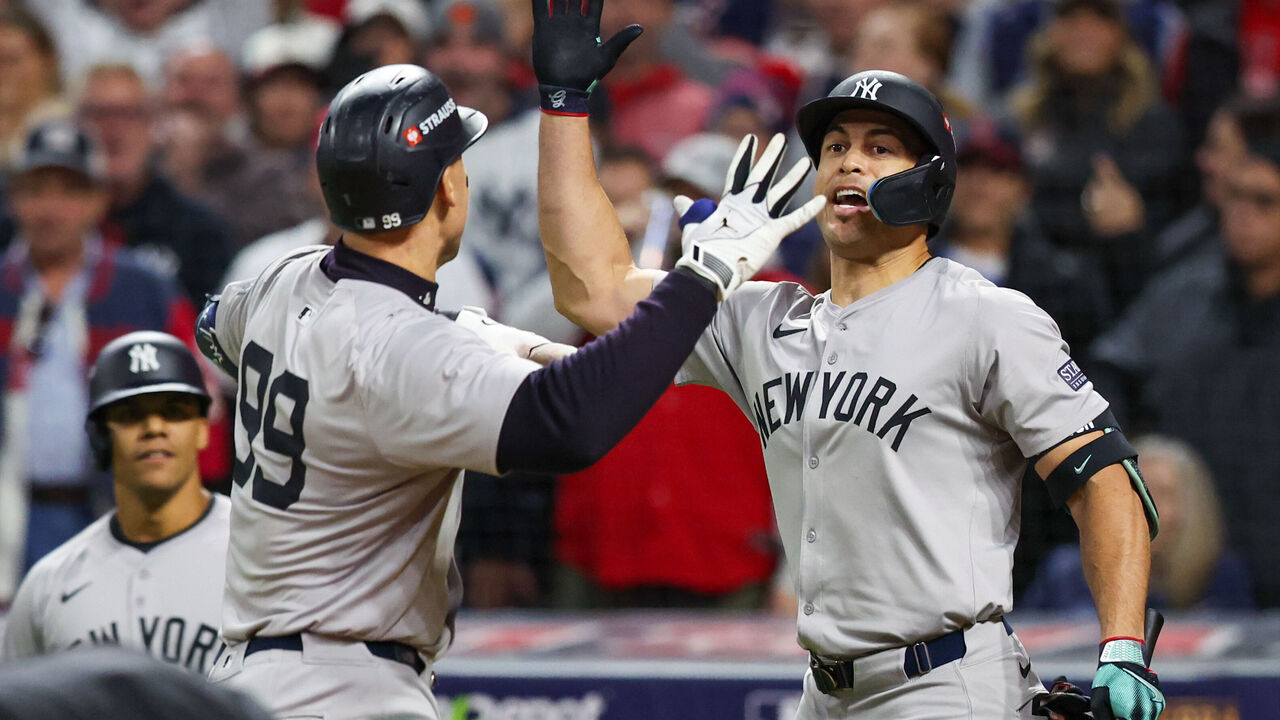Best game ever?! Appreciating ALCS Game 3
CLEVELAND - Moments after Game 3 of the American League Championship Series ended Thursday night, I made my way from the press level at Progressive Field to the clubhouses.
On my descent, I happened to share the same elevator car as the TBS television crew. In the cramped space, someone asked play-by-play announcer Brian Anderson about his emphatic calls of the game-tying and game-winning homers. He said he couldn't recall exactly what he said, just that he was yelling. Anderson's been calling baseball for 25 years and all he remembered was the emotion, not the words.
The reactions and @BAndersonPxP's calls from the booth last night 🔥 pic.twitter.com/zQPxaPtZ6O
— B/R Walk-Off (@BRWalkoff) October 18, 2024
After the postgame availabilities, I returned to the press level. Longtime Cleveland Guardians radio play-by-play voice Tom Hamilton was leaving for the night. He exclaimed to a passerby in the corridor: "You won't ever see a better game than that!"
Hamilton should know; he's called thousands of baseball games, including the three World Series that Cleveland has played in since 1995. The texts flooding my phone and the posts on social media echoed his sentiments.
Recency bias often plays tricks, preventing us from being objective. Immediately after we witness a great game or performance, we proclaim it "the best ever!" But that's an awfully high bar to clear.

Game 3 of the 2024 ALCS between the New York Yankees and the Cleveland Guardians was, of course, not a championship-round game. It wasn't even an elimination game. But it was objectively the best game of an MLB postseason that's included a few great ones so far. And by some measures, it was the best game of its kind in more than a decade.
For context, consider Baseball Reference's Championship Win Probability Added statistic (cWPA), which measures how a player's performance impacts their team's chances of winning the World Series.
The top play of all time by cWPA was Hal Smith's three-run homer with two outs in the bottom of the eighth during Game 7 of the 1960 World Series. The Pittsburgh Pirates trailed by a run, and the blast flipped their probability of winning the World Series by more than 63 percentage points. The Yankees clawed back in the top of the ninth to tie the game 9-9. Bill Mazeroski's famous walk-off homer in the bottom of the ninth is the sixth-ranked cWPA event in history (37.6%). Basically, it's tough to top Game 7 of the 1960 World Series.
FOR YOUR VIEWING PLEASURE CLEVELAND!!!@CleGuardians pic.twitter.com/pFJXq1Fghe
— Pete Marek (@PeteMarek) October 18, 2024
Thursday night's game was not in the World Series, so it's almost impossible to swing championship-winning chances at historic levels.
That said, of the 10 plays with the highest cWPA in the 2024 postseason, four occurred in Game 3 of the ALCS - all within the final three innings and a 72-minute span.
Those four plate appearances - two from the Yankees and two from the Guardians - shifted each team's World Series-winning chances by 3 percentage points or more. (There haven't been four such plays in a single game during the first three games of an ALCS since Game 3 of the 2013 ALCS between Boston and Detroit.)
The Guardians were feeling confident when manager Stephen Vogt summoned closer Emmanuel Clase to the mound following a two-out walk of Juan Soto in the eighth. Cleveland held a 3-1 lead with a 91% win probability, according to FanGraphs.
Clase was the top closer in the regular season, allowing just two home runs in 142 plate appearances against right-handed hitters. But he entered the game Thursday and gave up back-to-back home runs to Aaron Judge and Giancarlo Stanton.

If the Guardians had to do it over again, Clase and catcher Bo Naylor probably wouldn't have let Judge extend his arms to reach an outside cutter. Still, it required a remarkable swing to slash the darting 99-mph pitch just over the right-field wall.
Stanton followed with a shot to right center.
The Yankees' bench celebrated wildly, spilling out of the dugout. The game - the series - was in their grasp following their remarkable change of fortune.
The Judge swing reduced the Guardians' chances of winning the game by 33 percentage points, and the Stanton shot shaved them by another 29.
Postseason go-ahead belly-to-belly from John Sterling 🔥🎙 pic.twitter.com/ux4hvbdzGm
— New York Post Sports (@nypostsports) October 17, 2024
With the Guardians trailing by two runs in the bottom of the ninth, the once-raucous Cleveland crowd went silent when Josh Naylor grounded into a double play. Down to their final out, the Guardians' probability of winning had tumbled to 1%.
That chance shrunk into decimal places when the next batter, Lane Thomas, was down to his final strike.
But Thomas doubled, and Jhonkensy Noel - nicknamed "Big Christmas" - was sent to the plate as a pinch hitter with one job.
"He pinch hit to hit a homer. That's why we sent him up there," Vogt said.
Noel smashed a no-doubt, game-tying home run to left. In the bottom of the 10th inning, David Fry followed with his walk-off.
As Fry began to trot down the first-base line and the crowd rose, following the no-doubt arc of the ball's flight, Yankees manager Aaron Boone tossed his chewing gum in frustration. Two lightning bolts had vaporized the Yankees' opportunity to take a 3-0 stranglehold on the series.
Postgame, Boone was asked if his club "might have felt, 'We've got this in the bag'?"
"Come on. No," Boone said. "Got this in the bag? Stop it with that."
Any heartbreak the Yankees might have felt wasn't on the same level as Cleveland's after losing Game 7 of the World Series in 1997 and 2016.
We watch sports for a chance to see the improbable. Fans seek moments of ecstasy, but they aren't as sweet without the bitter experience of heartache. Game 3 had it all.
I got into the parking garage elevator with who I presumed was a father and two teenage sons.
"Good ballgame, " I deadpanned.
"Best ever!" one of them responded.
Hyperbole? Sure. But those who saw it won't forget it anytime soon.
Travis Sawchik is theScore's senior baseball writer.